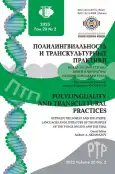How to Write the Histories of National Literatures?
- Autores: Ibraghimov M.I.1
-
Afiliações:
- G. Ibraghimov’s Institute of Language, Literature and Arts of the Academy of Sciences of the Republic of Tatarstan
- Edição: Volume 20, Nº 2 (2023): BETWEEN THE FOREST AND THE STEPPE: LANGUAGES AND LITERATURE OF THE PEOPLES OF THE VOLGA REGION AND THE URAL
- Páginas: 312-321
- Seção: LITERARY SPACE
- URL: https://journal-vniispk.ru/2618-897X/article/view/326701
- DOI: https://doi.org/10.22363/2618-897X-2023-20-2-312-321
- EDN: https://elibrary.ru/LDLSMU
- ID: 326701
Citar
Texto integral
Resumo
The aim of the paper is to accentuate the problem of theoretical-and-metidological basis for writing the histories of national literatures of peoples of Russia. The main objectives imply the generalization of the experience on national literatires’ histories writing, mainly on the material of the Volga Region literatures) and to represent the concept of “The History of Tatar Literature” in Russian. Because of the lack of attention to national literatures in Russia various types of histories of national literatures such as academic, popular, educational, are in demand. The D.S. Likhachyov’ idea of theoretical history of literature is chosen as a concept for academic five-volume “History of Tatar Literature” (the project is being realized by the G. Ibraghimov’s Institute of Language, Literature and Arts of the Academy of Sciences of the Republic of Tatarstan). At the same time the concept is to be corrected according to the so-called “expectation horizon” of a Russian reader, not being aware of Tatar literature well enough.
Palavras-chave
Sobre autores
Marcel Ibraghimov
G. Ibraghimov’s Institute of Language, Literature and Arts of the Academy of Sciences of the Republic of Tatarstan
Autor responsável pela correspondência
Email: mibragimov1000@mail.ru
ORCID ID: 0000-0002-7805-3167
Código SPIN: 4217-6864
Associate Professor, PhD in Philology, Senior Researcher of Literary Studies
20 Baumana st., Kazan, 420111, Russian FederationBibliografia
- Rodionov, V. 2011. History of the Chuvash literature of the XX century (Concept). Cheboksary. Print. (In Russ.).
- Safiullin, Ya.G. 2021. “The concept of “national literature”: metamorphoses of content”. In From Romanticism to Comparison of Literatures. Kazan: IYALI publ. Print. (In Russ.).
- Vasilyev, N.L. 2003. “Historicism and Relativity of the Concept ‘National Literature’”. In Comparative Literature: Theoretical and Historical Aspects: Proceedings of the International Scientific Conference “Comparative Literature” (V Pospel Readings). Moscow: Moscow University publ. Print. Pp. 53–59. (In Russ.).
- Sultanov, K. 2015. “About the ‘ethno-cultural turning-point’ in the study of the literature of peoples of Russia”. STEPHANOS 2: 10–19. Print. (In Russ.).
- Azәrbaycan әdәbiyyatı tarixi. On cilddә, I cild. Şifahi xalq әdәbiyyatı. [History of Azerbaijani literature: in 10 vol. Vol. 1. Folklore]. 2018. Baku: Elm publ. Print. (In Azerbaijan).
- Gabibbejli, I. 2020. “The concept of periodization of Azerbaijani literature and stages of development”. In Literature, time, modernity. Moscow: Hudozhestvennaya literatura publ. Print. (In Russ.).
- Zagidullina, D. 2021. “Tatar әdәbiyaty tarihy”nyң tulylandyrylgan sigeztomlygy turynda” [About the supplemented eight-volume “History of Tatar Literature”]. In: Tatar әdәbiyaty tarihy [History of Tatar Literature: in 8 volumes]. Vol. 1. Kazan: Tatar Book publ. Print. P. 5–16. (In Tatar).
- Zemskov, V. 2014 “The history of literature as a genre. From origins to origins?” In Issues of studying the history of national literatures. Theory. Methodology. Modern Aspects. Moscow: Institute of World Literature of the Russian Academy of Sciences publ. Pp. 64–95. Print. (In Russ.).
- Zagidullina, D.F. 2000. Әdәbiyat kanunnary һәm zaman [The laws of literature and time]. Kazan: Tatar Book publ. Print. (In Tatar).
- History of the Chuvash literature of the XX century. 2017. Cheboksary: Chuvash publ. Print. (In Russ.).
- Udmurt Literature of the 20th Century: Directions and Trends in Development: Textbook. 1999. Izhevsk: Udmurt State University publ. Print. (In Russ.).
- Medieval Tatar literature (VIII — XVIII centuries). 1999. Kazan: Fen publ. Print. (In Russ.).
- History of the Tatar literature of modern times (XIX — early XX century). 2003. Kazan: Fiker publ. Print. (In Russ.).
- Likhachev, D.S. 1987. Selected Works. Moscow. Print. (In Russ.).
- Sharipov, A.M. 2001. The origin and formation of the system of poetic genres in ancient Turkic and Turkic-Tatar literature (VIII-XIV centuries). Kazan: Kazan University Press publ. Print. (In Russ.).
- Amineva, V.R. 2017. “Hikaya as a Literary Genre (based on A. Eniki’s Literary Works of the 1940s–1960s)”. Uchenye zapiski Kazanskogo universiteta. Ser. Gumanitarnye nauki 159: 7–25. Print. (In Russ.).
- Habibullina, A. 2021. Elegy. Elegiac, Elegism in Russian and Tatar Poetry: Criteria for a Comparative Study. Kazan: Shkola publ. Print. (In Russ.).
- Zagidullina, D.F. 2003. Modernizm һәm XX jөz tatar prozasy [Modernism and Tatar prose of the early 20th century]. Kazan: Tatar Book publ. Print. (In Tatar).
- Zagidullina, D.F. 2006. Dөn’ya surәte үzgәrү: XX jөz bashy tatar әdәbiyatynda fәlsәfi әsәrlәr [Changing the picture of the world: philosophical works in Tatar literature at the beginning of the 20th century]. Kazan: Mәgarif publ. (In Tatar)
- Safiullin, Ya.G. 2021. “From ‘Theory of Literature’ Dictionary”. In Safiullin, Ya.G. From Romanticism to Comparison of Literatures. Kazan: IYALI publ. Print. (In Russ.).
- Arzamazov, A. 2022. Mari-Udmurt poetic parallels and contrasts. Comparative reading experience: monograph. Kazan: Academy of Sciences of the Republic of Tatarstan publ. Print. (In Russ.).
- Gosmanov, M. 2014. “Miftahetdin Akmullanyң iҗaty һәm mirasy” [Creativity and heritage of Miftakhetdin Akmulla]. In Mirkasyjm Gosmanov: tarihi-biografik, fәnni-dokumental’ җyentyk [Mirkasym Usmanov: historical-biographical, scientific-documentary collection]. Kazan: Djien publ. Print. (In Tatar).
Arquivos suplementares









